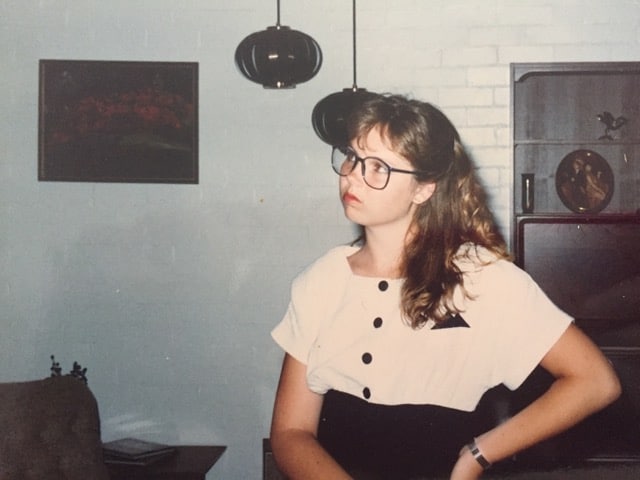What To Do When Your Tween or Teen Comes Home Cranky

See that girl? That’s me. I’m sixteen in that photo.
I look at that photo and I go straight back. I can remember my teen years like they were yesterday. I remember feeling hopeful, unsure, awkward, vulnerable, excited, fragile and bold.
I remember being in love with boys who never knew I existed. I remember being at lunch with my friends Lynne and Robin and laughing so hard that tears ran down my face. I remember hating everything about how I looked. I remember feeling jealous and unkind when Lynne tried to bring a new girl into our friendship group. I remember moments of humiliation and moments of real joy.
Here’s another memory.
When I was 15, I started working in a popular department store during the Christmas holidays. I always worked in the handbag department, dutifully dusting the wallets and bags. One Saturday morning, my beautiful mum came to visit me at work while she was shopping. My mum and I were very close, and we still are, but we’ve never looked alike – we are completely different builds, and she’s much smaller than me. Once she left the store, my manager Andrew* approached me and asked, “Was that your mum?”
When I said yes, he followed it with, “Oh, so your dad is fat?”
I knew exactly what he was saying – and even thirty-three years later, I still remember how much those words hurt.
I went home devastated, and took my foul mood out on my parents.
I was rude and grumpy to them, but I didn’t say a word about what had happened that day, even though we were close.
So often, as parents, we take our tween or teenager’s grumpy, cranky, cantankerous behaviour personally. I get emails from parents (or have therapeutic conversations in The Lighthouse Plan closed group) wondering why their kids are in such foul moods, grunting and grumbling when they get home from school.
At times like those, it can be helpful to remember what those years were like.
Our teens are fragile, vulnerable and still working out who they are, while the world (and sometimes their manager 😐) is telling them that who they are is not good enough. Then there’s school, which can be joyful, but also brutal. Our kids are dealing with big feelings and emotions, and sometimes the thought of talking about all of the day’s uncomfortable or unpleasant moments is just too humiliating or painful.
When your tween or teen comes home in a foul mood, don’t push them for answers. Instead, try one of these gentle connection strategies:
- Leave a hot chocolate in their room.
- Ask them to rate their day out of 10 – when articulating their feelings is too hard, giving a score to snapshot that feeling is easier.
- Write them a loving note in a journal and leave it in their room, giving them the opportunity to respond in writing. Something as simple as “You don’t seem yourself. Are you okay? Can I help?” can work wonders.
categories
You might also like...
About Bec
Over the past 25 years Rebecca Sparrow has earned a living as a travel writer, a television publicist, a marketing executive, a magazine editor, a TV scriptwriter, a radio producer, a newspaper columnist and as an author.
social media

subscribe
Want to know if your child is ready to have a social media account?
Enter your details below and I'll send you my 4-point checklist.


